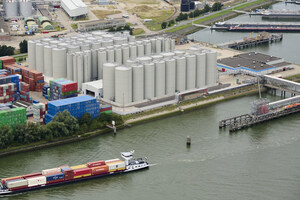Golden Agri-Resources: Latest Greenpeace Report Ignores Progress Being Made in Palm Sector
SINGAPORE, June 15, 2019 /PRNewswire/ -- Golden Agri-Resources (GAR) believes Greenpeace's latest press statement, released on 11 June 2019 entitled "50 million hectares destroyed as companies disregard zero deforestation pledge", fails to give an accurate picture of the transformation underway across the palm oil industry.
Specifically, we believe Greenpeace falsely states that GAR and other leading palm oil traders are not mapping and monitoring suppliers via satellites and taking meaningful action to halt deforestation and implement more sustainable production practices.
Since introducing the GAR Social and Environmental Policy in 2015, traceability and increasing transparency of our own operations and our supply chain has been a core component of GAR's sustainability effort.
For four years, GAR has been carrying out a major traceability exercise. The company has been fully traceable to the mill since 2015, and 100 percent traceable to the plantation (TTP) for all GAR-owned mills since end of 2017.
Beyond our direct operations we have convinced our third-party suppliers to join us in this important exercise. These efforts are bearing fruit and to date we have achieved over 60 percent TTP for our palm supply chain, keeping us on track to hit full TTP by end-2020.
This progress is regularly reported to our stakeholders and our supply chain traceability data is available to the public on our Sustainability Dashboard. GAR's efforts have been recognised with a variety of awards including, most recently, the ADB DutchCham Winsemius Award for Manufacturing and Supply Chains.
Currently, GAR is collaborating with customers to trial satellite monitoring systems such as Starling, which can help monitor forest cover change in some key areas. We are also supporting World Research Institute initiatives such as the GFW Pro tool which will enable companies, banks and organisations to analyse and manage deforestation risk within their supply chains.
Monitoring is a key starting point, but the transformation of our supply chain requires us to go beyond technology and take a constructive engagement approach to help our suppliers become more responsible, including investigating why deforestation has taken place and who is responsible. To date, through deep engagement, encouragement and sharing of best practices we are supporting the conservation of 65,000 hectares of HCSA forests by our suppliers.
Business commitments and interventions, alongside government actions, are starting to show results. Deforestation in Indonesia has shown another year of sharp decline, according to the WRI which has reported a 40 percent reduction in loss of primary forests in Indonesia compared to 2002-2016 figures and a 45 percent reduction in the loss of peat forest areas.
In ignoring this progress and suggesting palm oil producers are not taking their responsibilities to not only forest conservation but also farmer and supplier livelihoods seriously, Greenpeace perpetuates the negative narrative associated with the industry, fails to recognise the work underway to bring change and risks undermining those efforts.







Share this article